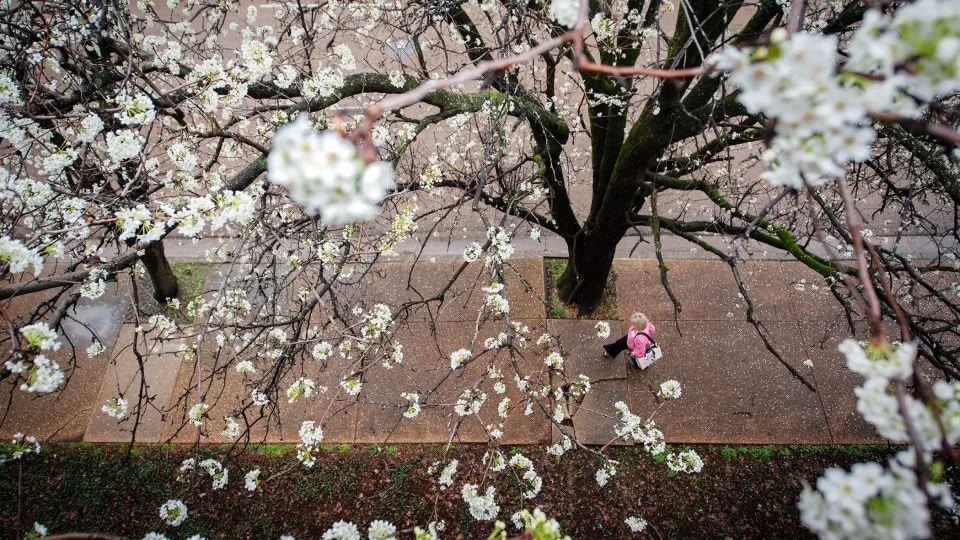For roughly 1 in 4 American adults, spring blooms mark the start of itchy, eye-watering, congested misery.
And looked at any number of ways, it’s only getting worse: Experts agree that more people are becoming allergic to airborne irritants like pollen and mold, allergy symptoms are more severe, and allergy seasons are lasting longer than ever.
You may also feel the increasing pollen burden even if you don’t have hay fever, as studies show that pollen perturbs the immune system even if it doesn’t inflame your airways.
If you’re already feeling it, you’re not alone.
Blame climate change
Scientists say intensified seasonal allergies are among the first wave of anticipated health impacts from global warning, along with greater exposure to infectious diseases.
Recent studies have revealed that growing zones in the US are shifting as the climate warms, allowing plants and trees to expand their ranges. Rising temperatures are also allowing plants to bloom earlier and longer, prolonging pollen seasons. Increased rainfall means plants release more pollen when they bloom, and higher numbers of thunderstorms cause pollen grains to burst, making them more irritating and worsening symptoms.
Shifting wind patterns in some parts of the world are carrying pollen over longer distances, too.
“At least in some areas of the world, pollen is being distributed more widely. And people are being potentially exposed to different types of pollen that they weren’t before,” said Dr. Mary Margaret Johnson, a principal research scientist at the Harvard T.H. Chan School of Public Health who studies the health effects of climate change.
There’s some evidence that increases in carbon dioxide in the atmosphere are making pollen more potent, too.
Researchers in South Korea grew oak trees in special chambers where they could control the amount of carbon dioxide in the air surrounding the plants, and they adjusted the carbon dioxide level to match the projected concentration in the year 2050. The trees were planted in September 2009. Eight years later, they bloomed, and researchers collected the pollen they produced and studied it.
“And what they found was that there are literally billions more pollen grains that are produced,” said Lewis Ziska, an associate professor of environmental health sciences at the Mailman School of Public Health at Columbia University. That pollen also seemed to be more allergenic.
“The protein on the exine – the outer shell of the the pollen – those proteins that cause your immune system to respond are increasing,” he said, noting that his research group had seen the same phenomenon in ragweed plants.
Beyond more potent pollen, the sheer quantities of it may be causing a problem. Experts think more exposure to pollen equals more chances to be sensitized, which equals more allergies.
According to the market research website market.us, global sales of antihistamines, the medications that reduce allergy symptoms, are set to more than double over the next decade as more people turn to pharmacy shelves for relief.
Allergists are staying busy
Over the past three decades, Dr. Joseph Inglefield III says he’s seen spring allergies kick off earlier each year.
“It’s at least a month earlier than it used to be,” said Inglefield, an allergist who owns Hickory Allergy and Asthma in Hickory, North Carolina.
This is the second year in a row with lots of rain in that region but no snow, Inglefield says, a climate pattern that’s a recipe for heavy spring pollen concentrations.
“We got pollen counts that were high in February, which is unusual,” he said.
A recent study that analyzed pollen counts across the US for the past 30 years, along with temperature fluctuations over the same time frame, points to why. It found a strong correlation between temperature and allergy season severity.
As the weather has warmed, pollen season has started about 20 days earlier and lasted eight days longer. There’s also been about 20% more pollen produced annually, mostly due to trees cranking out more of the yellow-green stuff. The study authors found the trends accelerating over time, with the biggest increases in the most recent years.
The trends get more pronounced as you go north.
“What we’re seeing is, as you move toward the poles, that things are warming up faster,” Ziska said.
So someone in Illinois, for example, might be seeing bigger changes in pollen than somebody in Texas – although Texas gets blasted with pollen, too.
Inglefield says that mirrors what he’s seeing in his patients, who tell him that their allergies are more severe than ever and that they need more medications to manage them.
“That’s a very common experience,” he said.
More bad news
The bad news for allergy sufferers doesn’t stop there. Dr. Leonard Bielory, an allergist and professor of medicine at the Hackensack Meridian School of Medicine in New Jersey, said he and his colleagues looked at the sensitization of the US population to various allergens over time and found that the number of different allergens that people are sensitive to has doubled over the past 25 years.
Climate may be playing a role in the rise of allergies, Bielory says, but it could be more than that, too.
“Everybody wants to say it’s climate per se, but it also could be a microbiome issue,” he says. Changes to the microbiome – the bacterial populations that live on our skin and in our gut – may be changing how our bodies respond to pollen when they first encounter it, priming the immune system to react.
If you’re someone who isn’t getting enough help from allergy medications anymore or you find yourself using a rescue inhaler often, it might be time to consider some kind of immunotherapy, which helps calm the immune system and keep it from reacting so strongly to your triggers, Inglefield said.
There are tablets now for grass, ragweed and dust mites, but if trees are the culprit, allergy shots are the only way to go.
“Really, that’s probably the most effective thing you can do at this point,” Inglefield said.
“What that does is, that may not help you this season, but it will help you next spring, so you won’t have as much trouble,” he said.
For more CNN news and newsletters create an account at CNN.com



